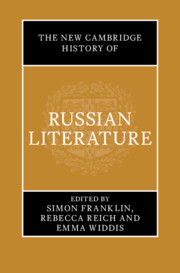Book contents
- The New Cambridge History of Russian Literature
- The New Cambridge History of Russian Literature
- Copyright page
- Contents
- Figures
- Contributors
- Acknowledgements
- On Transliteration, Names, and Dates
- Introduction
- History 1 Movements
- 1.1 The Age of Devotion
- 1.2 The Baroque Age
- 1.3 The Age of Classicism
- 1.4 Sentimentalism and Romanticism
- 1.5 The Natural School and Realism
- 1.6 Symbolism and the Fin de Siècle
- 1.7 Modernism and the Avant-Garde
- 1.8 Socialist Realism
- 1.9 Postmodernism
- 1.10 Contemporary Movements
- Boxes 1 Close Readings
- Boxes 2 Genres
- History 2 Mechanisms
- History 3 Forms
- History 4 Heroes
- Index
- References
1.4 - Sentimentalism and Romanticism
from History 1 - Movements
Published online by Cambridge University Press: 31 December 2024
- The New Cambridge History of Russian Literature
- The New Cambridge History of Russian Literature
- Copyright page
- Contents
- Figures
- Contributors
- Acknowledgements
- On Transliteration, Names, and Dates
- Introduction
- History 1 Movements
- 1.1 The Age of Devotion
- 1.2 The Baroque Age
- 1.3 The Age of Classicism
- 1.4 Sentimentalism and Romanticism
- 1.5 The Natural School and Realism
- 1.6 Symbolism and the Fin de Siècle
- 1.7 Modernism and the Avant-Garde
- 1.8 Socialist Realism
- 1.9 Postmodernism
- 1.10 Contemporary Movements
- Boxes 1 Close Readings
- Boxes 2 Genres
- History 2 Mechanisms
- History 3 Forms
- History 4 Heroes
- Index
- References
Summary
This chapter covers the period from the late 1780s through the late 1840s, and introduces two closely intertwined cultural movements: Russian Sentimentalism (or the age of sensibility) and Russian Romanticism (also known as the Golden Age of Russian poetry). Departing from debates on the paradoxes of Russian Romanticism, the chapter considers the genealogy and basic features of the movement by assessing the oeuvre and literary impact of the ‘father of Russian Romanticism’, the poet Vasilii Zhukovskii. To paraphrase a dictum wrongly attributed to Fedor Dostoevskii, it would not be an exaggeration to say that the literary spectre of Russian Romanticism came out of the angelic robes of this lofty, melancholy, and chaste poet, who playfully called himself the ‘poetic guardian of the English and German devils and witches’.
Keywords
- Type
- Chapter
- Information
- The New Cambridge History of Russian Literature , pp. 71 - 88Publisher: Cambridge University PressPrint publication year: 2024

